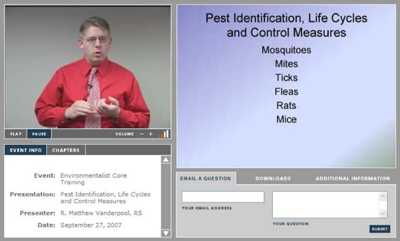Environmental Public Health Online Courses (EPHOC)
EPHOC is an online/on-demand package of e-learning courses for environmental public health practitioners. The goal is to provide access to comprehensive, worthwhile, and affordable workforce development resources for practitioners in environmental public health. This has been a major issue of concern across the United States for the past decade or more.
Get Started Today
- Go to the South Central Partnership Web site.
- Click Environmental Public Health Online Courses.
- Log in or create a new account to enroll for EPHOC courses.

Log on at the South Central Partnership Web site.
EPHOC Courses
EPHOC courses are free. They are taught by a group of environmental public health subject-matter experts from across the country. Each course includes a pretest, a number of individual 40- to 60-minute modules, and a posttest. Course content includes information on various roles and responsibilities of environmental public health staff.
Target audiences are
- New-hire environmental public health professional with a science major BS
- Individuals preparing for a state or national credential exam
- Environmental health and other students
- Environmental public health professionals wanting to improve their technical knowledge
NEHA will award REHS/RS continuing education credit for each course successfully completed.
EPHOC Course Instructors and Affiliations
The list below shows the 15 courses and instructors for the total of over 45 hours of training. The instructor group is a mix of academic professors and environmental public health practitioners in different agency settings who planned their courses and created “lecture-style” presentations.
- General Environmental Health (Sharunda Buchanan, Centers for Disease Control and Prevention/National Center for Environmental Health/Division of Emergency and Environmental Health Services [CDC/NCEH/EEHS]; and Charles Otto, CDC/NCEH/EEHS/Environmental Health Services Branch [EHSB]).
- Statutes and Regulations (David Maxey, Jefferson County Department of Health).
- Food Protection (Alan Tart, U.S. Food and Drug Administration).
- Potable Water (Joe Cotruvo, Joseph Cotruvo & Associates; and Mike Herring, CDC/NCEH/EEHS/EHSB).
- Wastewater (Allen Tartt, AOWA Training Center, University of West Alabama).
- Solid and Hazardous Waste (Jason Kirby, University of Alabama Birmingham [UAB] School of Engineering).
- Hazardous Materials (Jason Kirby, UAB School of Engineering).
- Zoonoses, Vectors, Pests, and Weeds (Matt Vanderpool, Louisville Metro Department of Public Health and Wellness).
- Radiation Protection (Norman Bolus, UAB School of Health Professions Nuclear Medicine Technology Program).
- Occupational Safety and Health (Elizabeth Maples, UAB School of Public Health Environmental Health Sciences).
- Air Quality and Environmental Noise (Corey Masuca, Jefferson County Department of Health).
- Housing Sanitation and Safety (Genevieve Birkby, Baltimore City Health Department).
- Institutions and Licensed Establishments (Leon Vinci, Health Promotion Consultants / Bailus Walker, Howard University / Vince Radke (CDC/NCEH/EEHS/EHSB); and Jasen Kunz, CDC/NCEH/EEHS/EHSB).
- Swimming Pools and Recreational Facilities (Troy Perry, Jefferson County Department of Health).
- Disaster Sanitation (Mark Miller, CDC/NCEH/EEHS/EHSB).
EPHOC Partners
- Jefferson County Department of Health’s Environmental Services.
- National Environmental Health Association.
- CDC/NCEH/EEHS’s Environmental Health Services Branch.
- South Central Center for Public Health Preparedness (UAB School of Public Health and the Tulane School of Public Health and Tropical Medicine)
More Information
For more information on EPHOC read about:
- EPHOC Fact Sheet [PDF – 554 KB]
- EPHOC Acknowledgments, Course Instructors, and Affiliations [PDF – 27 KB]
- EPHOC: A New Training Resource for the Environmental Public Health Workforce [PDF – 195 KB] in the March 2010 issue of the Journal of Environmental Health.
- Environmental Public Health Online Course (EPHOC) Series: Are We Making a Difference? [PDF – 272 KB] in the June 2013 issue of the Journal of Environmental Health.
- Page last reviewed: March 24, 2016
- Page last updated: June 7, 2017
- Content source:


 ShareCompartir
ShareCompartir